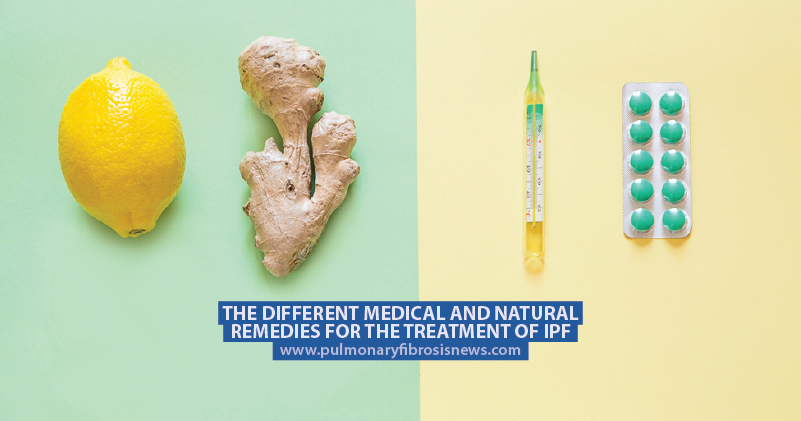The Different Medical and Natural Remedies for the Treatment of IPF
Written by |

With the documented success rate and benefits of naturopathic treatment for various chronic illnesses, it is hard for patients not to consider how natural remedies might help with their personal diagnosis. Natural remedies such as the use of essential oils or organic supplements, and those grounded in Chinese medicine such as acupuncture and herbal medicines, are gaining traction for their benefits in treating various diseases.
Medical Remedies
For someone with idiopathic pulmonary fibrosis (IPF), the sad truth is that the treatment options are currently limited and the prognosis of survival beyond three to five years remains poor. This is because Western medicine or the traditional medical treatment of this disease includes just two approved anti-fibrotic medications that are used to slow down the progression of fibrosis in the lungs.
There currently aren’t any medications that a patient with IPF can take to stop or reverse the fibrosis and damage in the lungs, leaving the only real “cure” to IPF being a double lung transplant. For those who don’t want to endure organ transplantation for personal or health reasons, or for those who can’t withstand such a surgery, the other options for treating, or even for living better with IPF are few. That is unless a patient considers natural remedies for the treatment or management of their disease.
MORE: Four tried-and-true tips for coping with a chronic illness
Natural Remedies
When considering natural remedies for the management of IPF, it is hard to know where to begin. The Internet is filled with a plethora of information about naturopathic options to treat chronic illness, and some of it is legitimate and credible, however much of it is not. This is where patients have to be careful.
The other consideration is that often times, natural remedies target a symptom of a disease that is contributing to a vicious cycle of other symptoms or an overall decline in a person’s health. For example, patients with IPF are familiar with inflammation both in the lungs and joints, as often times rheumatoid arthritis goes hand in hand with the diagnosis of IPF.
A naturopathic treatment for reducing inflammation could include the use of certain essential oils or acupuncture, which can improve mobility and patients’ joints, enabling them to be more active and reducing their pain levels. Reducing inflammation in the lungs would also likely increase the process of oxygenation, which is something IPF patients struggle with as their disease progresses.
This is just one example of how natural or Chinese medicines may be used to target a symptom of chronic illness that causes a patient pain, immobility or reduced ability to breathe and how eliminating or treating that symptom could benefit patients, particularly those living with IPF. This all being said, it is incredibly important to speak with a doctor, as well as other professionals who have access to credible literature on how natural remedies might help in the treatment of specific chronic illnesses.
MORE: Three professionals to talk to before traveling with IPF/PF
The Debate
The debate about the use of traditional medicine versus natural remedies for the treatment of chronic illnesses across social media, television (both fictional and non-fictional series), and medical journals, as well as among patients remains a very controversial topic.
There are documented success stories of people claiming to cure their chronic illness, or at least alleviate symptoms naturally. As a result, it’s hard for patients not to consider an alternative to Western medicine, especially for diseases where treatment options that are known to work are rare, such as IPF.
MORE: Four breathing exercises for pulmonary fibrosis
Pulmonary Fibrosis News is strictly a news and information website about the disease. It does not provide medical advice, diagnosis or treatment. This content is not intended to be a substitute for professional medical advice, diagnosis, or treatment. Always seek the advice of your physician or another qualified health provider with any questions you may have regarding a medical condition. Never disregard professional medical advice or delay in seeking it because of something you have read on this website.





